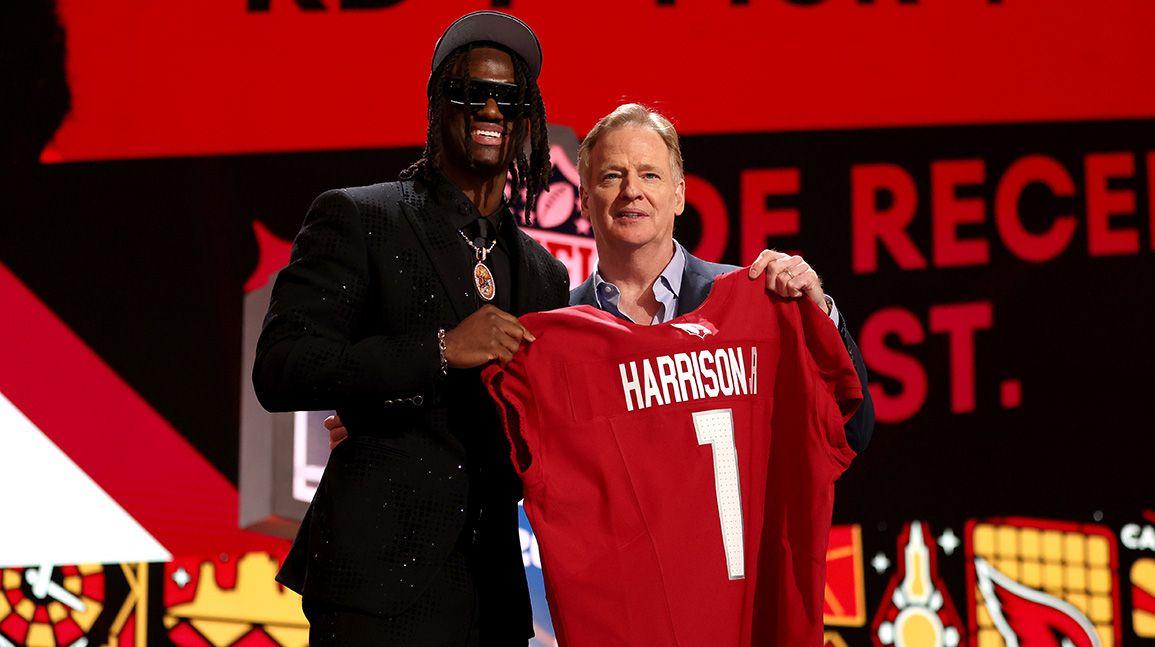You might have heard the news, especially if you are an Arizona Cardinals fan: You can’t buy a jersey of your new No. 1 draft pick, wide receiver Marvin Harrison Jr.
That's because the former Ohio State star, who was selected No. 4 overall in the 2024 NFL Draft last Thursday, has not signed the group licensing agreement that allows his name to be on NFL products.
What does it all mean, and could it change? It's quite a complicated issue, so cllct is here to break it down for you.
What is the group licensing agreement (GLA)?
The GLA allows the NFL Players Association to collectively sell players' names to licensees. When players sign the GLA, they give rights to put their name and images on cards, video games and on jerseys.
It allows those who pay for licenses to be able to use any player, as long as they use at least six players.
And before you worry about fantasy football, don't fret: Harrison Jr. will be available in your draft because the courts have ruled that names are in the public domain when tied to the statistics.
Is the GLA a good deal for players?
If you are an offensive lineman, or you aren't a top player, you make around $25,000 from licensing rights per year, which almost pays for your union dues.
For second-tier players, it's not that lucrative. Let's give you an inside the look at some of the numbers from the 2022-23 season, the last current year filed with the U.S. Department of Labor.
Jerry Jeudy, WR, Broncos: $125,973 Dallas Goedert, TE, Eagles: $162,598 Justin Tucker, K, Ravens: $187,044 D'Andre Swift, RB, Lions: $235,778 Derek Carr, QB, Raiders: $246,282
This might seem like a great deal, but considering how much these guys make from their NFL contracts, it's a drop in the bucket.
The stars make a lot more, but the deals they get, given how much they sell and how essential they are to moving merchandise, is debatable. Here are the top five for the 2022-23 fiscal year:
Tom Brady, QB, Bucs, $6.8 million Trevor Lawrence, QB, Jaguars, $2.8 million Patrick Mahomes, QB, Chiefs, $2.3 million Dak Prescott, QB, Cowboys, $2.1 million Kenny Pickett, QB, Steelers, $1.6 million
What is the risk of Harrison Jr. holding out on the GLA?
Like any holdout, it depends on how long he holds out. The fact Kenny Pickett was at No. 5 on the 2022-23 tells you all you need to know. The University of Pittsburgh product was drafted by the Steelers, and local fans clamored to buy his jersey. Two years later, Pickett was gone, traded to cross-state rival, Philadelphia.
Draft time is a huge time of hope, and the Cardinals fans need to replace their Watt, Hopkins and even Fitzgerald jerseys.
Will Harrison Jr. do better on his own?
This is also a "depends" question. It depends on how good he is, and whether companies see they need to reach a deal separately with him. If he can do two or three deals, it likely will benefit him. If he holds out for long, he's betting on himself.
Panini and Fanatics give more than $30 million a year to the union for licensing rights, and Harrison Jr. is now not included. How good does he have to be for licensees to want to grab him and do a separate, more expensive deal?
What does Harrison Jr. have going for him?
We're told his father, Hall of Fame receiver Marvin Harrison, is very much in the mix here. It would make sense that this comes from his own frustration with not being able to cash in enough on his own likeness throughout his career. Having the Colts legend in the room, with the power of his name, is definitely key to trying to make this work.
What Does Harrison Jr. have going against him?
The answer here is "a lot."
Harrison Jr. is the first player in the NFL to do this since LaVar Arrington did it nearly 25 years ago. Arrington came in as the second overall draft pick in 2000 and had all the hype in the world coming out of Penn State. If he had lived up to the "Lawrence Taylor II" expectations, maybe it would have worked for him — but it didn't because he frankly wasn't good enough for licensees to want to pay.
In fact, the only players who have successfully used this tactic all had the leverage of their greatness. Michael Jordan opted out of the NBA's group licensing agreement from 1992-1998. That agreement didn't allow him to opt out of cards, but did on video games and other items. Barry Bonds was the only player in MLB union history to opt out of the group licensing agreement. He did in the 2004 season, which resulted in Bonds becoming "John Dowd" in the "MVP Baseball 2005" video game.
If Harrison Jr. is looking for leverage, it's going to be hard. The NFLPA is not going to easily let language be changed on an individual player because it would set a bad precedent. Second, being in the Arizona market isn't exactly holding a good chess piece.
If Harrison Jr. really were looking for leverage, he should have recruited other high first-round picks to join him. Then, the chances of change would have been much better.
Darren Rovell is the founder of cllct.com and one of the country's leading reporters on the collectible market. He previously worked for ESPN, CNBC and The Action Network.

